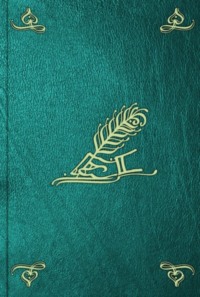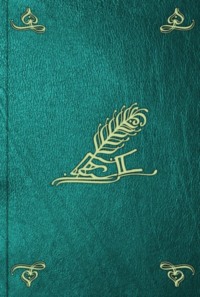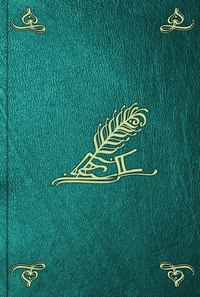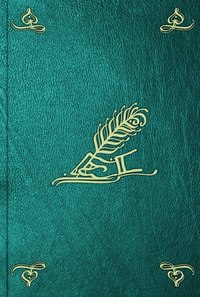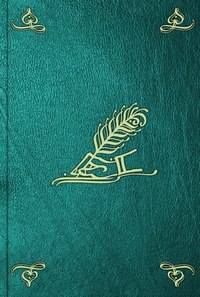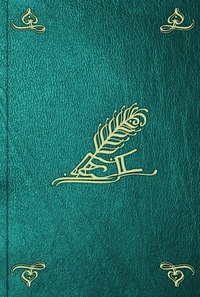 полная версия
полная версияCharles Darwin: His Life Told in an Autobiographical Chapter, and in a Selected Series of His Published Letters
68
Autobiography p. 10.
69
From a letter to W. D. Fox.
70
No doubt in allusion to the title of Lord Herbert of Cherbury.
71
Panagæus crux-major.
72
Formerly Reader in Natural Philosophy at Durham University.
73
Blane was afterwards, I believe, in the Life Guards; he was in the Crimean War, and afterwards Military Attaché at St. Petersburg. I am indebted to Mr. Hamilton for information about some of my father's contemporaries.
74
Brother of Lord Sherbrooke.
75
March 18, 1829.
76
The postmark being Derby seems to show that the letter was written from his cousin, W. D. Fox's house, Osmaston, near Derby.
77
The top of the hill immediately behind Barmouth was called Craig-Storm, a hybrid Cambro-English word.
78
Rev. T. Butler, a son of the former head master of Shrewsbury School.
79
No doubt a paid collector.
80
The "Captain" is at the head of the "Poll": the "Apostles" are the last twelve in the Mathematical Tripos.
81
For an explanation of the word "gulfed" or "gulphed," see Mr. W. W. Rouse Balls' interesting History of the Study of Mathematics at Cambridge (1889), p. 160.
82
The Beagle should have started on Nov. 4, but was delayed until Dec. 27.
83
See, too, a sketch by my father of his old master, in the Rev. L. Blomefield's Memoir of Professor Henslow.
84
The copy of Humboldt given by Henslow to my father, which is in my possession, is a double memento of the two men – the author and the donor, who so greatly influenced his life.
85
Formerly Dean of Ely, and Lowndean Professor of Astronomy at Cambridge.
86
Josiah Wedgwood.
87
William Snow Harris, the Electrician.
88
Voyages of the Adventure and Beagle, vol. i. introduction xii. The illustration at the head of the chapter is from vol. ii. of the same work.
89
His other nickname was "The Flycatcher." I have heard my father tell how he overheard the boatswain of the Beagle showing another boatswain over the ship, and pointing out the officers: "That's our first lieutenant; that's our doctor; that's our flycatcher."
90
"There was such a scene here. Wickham (1st Lieutenant) and I were the only two who landed with guns and geological hammers, &c. The birds by myriads were too close to shoot; we then tried stones, but at last, proh pudor! my geological hammer was the instrument of death. We soon loaded the boat with birds and eggs. Whilst we were so engaged, the men in the boat were fairly fighting with the sharks for such magnificent fish as you could not see in the London market. Our boat would have made a fine subject for Snyders, such a medley of game it contained." – From a letter to Herbert.
91
"My mind has been, since leaving England, in a perfect hurricane of delight and astonishment." —C. D. to Fox, May 1832, from Botofogo Bay.
92
The importance of these results has been fully recognized by geologists.
93
Sedgwick wrote (November 7, 1835) to Dr. Butler, the head master of Shrewsbury School: – "He is doing admirable work in South America, and has already sent home a collection above all price. It was the best thing in the world for him that he went out on the voyage of discovery. There was some risk of his turning out an idle man, but his character will now be fixed, and if God spares his life he will have a great name among the naturalists of Europe…" – I am indebted to my friend Mr. J. W. Clark, the biographer of Sedgwick, for the above extract.
94
Compare the following passage from a letter (Aug. 25, 1845) addressed to Lyell, who had touched on slavery in his Travels in North America. "I was delighted with your letter in which you touch on Slavery; I wish the same feelings had been apparent in your published discussion. But I will not write on this subject, I should perhaps annoy you, and most certainly myself. I have exhaled myself with a paragraph or two in my Journal on the sin of Brazilian slavery; you perhaps will think that it is in answer to you; but such is not the case. I have remarked on nothing which I did not hear on the coast of South America. My few sentences, however, are merely an explosion of feeling. How could you relate so placidly that atrocious sentiment about separating children from their parents; and in the next page speak of being distressed at the whites not having prospered; I assure you the contrast made me exclaim out. But I have broken my intention, and so no more on this odious deadly subject." It is fair to add that the "atrocious sentiments" were not Lyell's but those of a planter.
95
According to the Japan Weekly Mail, as quoted in Nature, March 8, 1888, the Beagle is in use as a training ship at Yokosuka, in Japan. Part of the old ship is, I am glad to think, in my possession, in the form of a box (which I owe to the kindness of Admiral Mellersh) made out of her main cross-tree.
96
The Museum of the Zoological Society, then at 33 Bruton Street. The collection was some years later broken up and dispersed.
97
William Lonsdale, b. 1794, d. 1871, was originally in the army, and served at the battles of Salamanca and Waterloo. After the war he left the service and gave himself up to science. He acted as assistant-secretary to the Geological Society from 1829-42, when he resigned, owing to ill-health.
98
T. Bell, F.R.S., formerly Professor of Zoology in King's College, London, and sometime secretary to the Royal Society. He afterwards described the reptiles for the Zoology of the Voyage of the Beagle.
99
I have often heard him speak of the despair with which he had to break off the projecting extremity of a huge, partly excavated bone, when the boat waiting for him would wait no longer.
100
A trifling record of my father's presence in Cambridge occurs in the book kept in Christ's College Combination-room, in which fines and bets are recorded, the earlier entries giving a curious impression of the after-dinner frame of mind of the Fellows. The bets are not allowed to be made in money, but are, like the fines, paid in wine. The bet which my father made and lost is thus recorded: —
"Feb. 23, 1837.– Mr. Darwin v. Mr. Baines, that the combination-room measures from the ceiling to the floor more than x feet.
"1 Bottle paid same day."The bets are usually recorded in such a way as not to preclude future speculation on a subject which has proved itself capable of supplying a discussion (and a bottle) to the Room, hence the x in the above quotation.
101
Spring Rice.
102
Phil. Trans., 1839, pp. 39-82.
103
Sir Archibald Geikie has been so good as to allow me to quote a passage from a letter addressed to me (Nov. 19, 1884): – "Had the idea of transient barriers of glacier-ice occurred to him, he would have found the difficulties vanish from the lake-theory which he opposed, and he would not have been unconsciously led to minimise the altogether overwhelming objections to the supposition that the terraces are of marine origin."
It may be added that the idea of the barriers being formed by glaciers could hardly have occurred to him, considering the state of knowledge at the time, and bearing in mind his want of opportunities of observing glacial action on a large scale.
104
In a letter of Sept. 13 he wrote: – "It will be a curious point to geologists hereafter to note how long a man's name will support a theory so completely exposed as that of De Beaumont has been by you; you say you 'begin to hope that the great principles there insisted on will stand the test of time.' Begin to hope: why, the possibility of a doubt has never crossed my mind for many a day. This may be very unphilosophical, but my geological salvation is staked on it."
105
At the meeting of the British Association.
106
Daughter of Josiah Wedgwood of Maer, and grand-daughter of the founder of the Etruria Pottery Works.
107
July 1877.
108
I must not omit to mention a member of the household who accompanied him. This was his butler, Joseph Parslow, who remained in the family, a valued friend and servant, for forty years, and became, as Sir Joseph Hooker once remarked to me, "an integral part of the family, and felt to be such by all visitors at the house."
109
Charles Darwin, Nature Series, 1882.
110
To Sir John Herschel, May 24, 1837. Life of Sir Charles Lyell, vol. ii. p. 12.
111
He wrote to Herbert: – "I have long discovered that geologists never read each other's works, and that the only object in writing a book is a proof of earnestness, and that you do not form your opinions without undergoing labour of some kind. Geology is at present very oral, and what I here say is to a great extent quite true." And to Fitz-Roy, on the same subject, he wrote: "I have sent my South American Geology to Dover Street, and you will get it, no doubt, in the course of time. You do not know what you threaten when you propose to read it – it is purely geological. I said to my brother, 'You will of course read it,' and his answer was, 'Upon my life, I would sooner even buy it.'"
112
The first edition was published in 1839, as vol. iii. of the Voyages of the 'Adventure' and 'Beagle.'
113
No doubt proof-sheets.
114
Three Generations of Englishwomen, by Janet Ross (1888), vol. i. p. 195.
115
This refers to the third and last of his geological books, Geological Observation on South America, which was published in 1846. A sentence from a letter of Dec. 11, 1860, may be quoted here – "David Forbes has been carefully working the Geology of Chile, and as I value praise for accurate observation far higher than for any other quality, forgive (if you can) the insufferable vanity of my copying the last sentence in his note: 'I regard your Monograph on Chile as, without exception, one of the finest specimens of Geological inquiry.' I feel inclined to strut like a turkey-cock!"
116
An unfulfilled prophecy.
117
The late Sir C. Bunbury, well known as a palæobotanist.
118
The beetle Panagæus crux-major.
119
His sister.
120
John Lindley (b. 1799, d. 1865) was the son of a nurseryman near Norwich, through whose failure in business he was thrown at the age of twenty on his own resources. He was befriended by Sir W. Hooker, and employed as assistant librarian by Sir J. Banks. He seems to have had enormous capacity for work, and is said to have translated Richard's Analyse du Fruit at one sitting of two days and three nights. He became Assistant-Secretary to the Horticultural Society, and in 1829 was appointed Professor of Botany at University College, a post which he held for upwards of thirty years. His writings are numerous; the best known being perhaps his Vegetable Kingdom, published in 1846.
121
Shortly afterwards he received a fresh mark of esteem from his warm-hearted friend: "Hooker's book (Himalayan Journal) is out, and most beautifully got up. He has honoured me beyond measure by dedicating it to me!"
122
In 1860 he wrote to Lyell: "Is not Krohn a good fellow? I have long meant to write to him. He has been working at Cirripedes, and has detected two or three gigantic blunders, about which, I thank Heaven, I spoke rather doubtfully. Such difficult dissection that even Huxley failed. It is chiefly the interpretation which I put on parts that is so wrong, and not the parts which I describe. But they were gigantic blunders, and why I say all this is because Krohn, instead of crowing at all, pointed out my errors with the utmost gentleness and pleasantness."
There are two papers by Aug. Krohn, one on the Cement Glands, and the other on the development of Cirripedes, Weigmann's Archiv. xxv. and xxvi. See Autobiography, p. 39, where my father remarks, "I blundered dreadfully about the cement glands."
123
The duplicate type-specimens of my father's Cirripedes are in the Liverpool Free Public Museum, as I learn from the Rev. H. H. Higgins.
124
Vol. xliv. No. 269.
125
Life and Letters, vol. ii. p. 180.
126
This letter was unaccountably overlooked in preparing the Life and Letters for publication.
127
Obituary Notice, p. viii.
128
Life and Letters, vol. ii. p. 190. In Mr. Huxley's chapter the passage beginning "Lyell with perfect right…" is given as a footnote: it will be seen that I have incorporated it with Mr. Huxley's text.
129
Lyell's Life and Letters, Letter to Haeckel, vol. ii. p. 436. Nov. 23, 1868.
130
Life and Letters, vol. ii. p. 188.
131
I have discussed in the Life and Letters the statement often made that the first sketch of his theory was written in 1839.
132
The late Mr. H. Wedgwood.
133
After Mr. Strickland's name comes the following sentence, which has been erased, but remains legible: "Professor Owen would be very good; but I presume he would not undertake such a work."
134
The words "several years ago and," seem to have been added at a later date.
135
Rev. L. Blomefield.
136
Mr. Jenyns' Observations in Natural History. It is prefaced by an Introduction on "Habits of observing as connected with the study of Natural History," and followed by a "Calendar of Periodic Phenomena in Natural History," with "Remarks on the importance of such Registers."
137
Rev. L. Blomefield.
138
In Bleak House.
139
Sir Joseph Hooker's Himalayan Journal.
140
The Philosophical Club, to which my father was elected (as Professor Bonney is good enough to inform me) on April 24, 1854. He resigned his membership in 1864. The Club was founded in 1847. The number of members being limited to 47, it was proposed to christen it "the Club of 47," but the name was never adopted. The nature of the Club may be gathered from its first rule: "The purpose of the Club is to promote as much as possible the scientific objects of the Royal Society; to facilitate intercourse between those Fellows who are actively engaged in cultivating the various branches of Natural Science, and who have contributed to its progress; to increase the attendance at the evening meetings, and to encourage the contribution and discussion of papers." The Club met for dinner at 6, and the chair was to be quitted at 8.15, it being expected that members would go to the Royal Society. Of late years the dinner has been at 6.30, the Society meeting in the afternoon.
141
The Vestiges of Creation, by R. Chambers.
142
A few words asking for information. The results were published in the Gardeners' Chronicle, May 26, Nov. 24, 1855. In the same year (p. 789) he sent a postscript to his former paper, correcting a misprint and adding a few words on the seeds of the Leguminosæ. A fuller paper on the germination of seeds after treatment in salt water, appeared in the Linnean Soc. Journal, 1857, p. 130.
143
The interval of eighteen years, from 1837 when he began to collect facts, would bring the date of this letter to 1855, not 1856, nevertheless the latter seems the more probable date.
144
"On the Law that has regulated the Introduction of New Species." —Ann. Nat. Hist., 1855.
145
Simon Bernard was tried in April 1858 as an accessory to Orsini's attempt on the life of the Emperor of the French. The verdict was "not guilty."
146
Annals and Mag. of Nat. Hist., 1855.
147
After the death, from scarlet fever, of his infant child.
148
"Abstract" is here used in the sense of "extract;" in this sense also it occurs in the Linnean Journal, where the sources of my father's paper are described.
149
"On the tendency of Species to form Varieties and on the Perpetuation of Varieties and Species by Natural Means of Selection." —Linnean Society's Journal, iii. p. 53.
150
This passage was published as a footnote in a review of the Life and Letters of Charles Darwin which appeared in the Quarterly Review, Jan. 1888. In the new edition (1891) of Natural Selection and Tropical Nature (p. 20), Mr. Wallace has given the facts above narrated. There is a slight and quite unimportant discrepancy between the two accounts, viz. that in the narrative of 1891 Mr. Wallace speaks of the "cold fit" instead of the "hot fit" of his ague attack.
151
That is to say, he would help to pay for the printing, if it should prove too long for the Linnean Society.
152
W. H. Harvey, born 1811, died 1866: a well-known botanist.
153
See a discussion on the date of the earliest sketch of the Origin in the Life and Letters, ii. p. 10.
154
The Origin of Species.
155
Miss Tollett was an old friend of the family.
156
In the first edition Chapter iv. was on Natural Selection.
157
The following characteristic acknowledgment of the help he received occurs in a letter to Hooker, of about this time: "I never did pick any one's pocket, but whilst writing my present chapter I keep on feeling (even when differing most from you) just as if I were stealing from you, so much do I owe to your writings and conversation, so much more than mere acknowledgments show."
158
Feb. 9th, 1858.
159
"When I go over the chapter I will see what I can do, but I hardly know how I am obscure, and I think we are somehow in a mutual muddle with respect to each other, from starting from some fundamentally different notions." – Letter of May 6th, 1859.
160
Of Hooker's Flora of Australia.
161
Origin of Species, 6th edition, vol. ii. p. 357. "But with the working ant we have an insect differing greatly from its parents, yet absolutely sterile, so that it could never have transmitted successively acquired modifications of structure or instinct to its progeny. It may well be asked how is it possible to reconcile this case with the theory of natural selection?"
162
In his next letter to Lyell my father writes: "The omission of 'living' before 'eminent' naturalists was a dreadful blunder." In the first edition, as published, the blunder is corrected by the addition of the word "living."
163
Darwin wrote to Asa Gray in 1860: – "The eye to this day gives me a cold shudder, but when I think of the fine known gradations, my reason tells me I ought to conquer the cold shudder."
164
Jean Louis Rodolphe Agassiz, born at Mortier, on the lake of Morat in Switzerland, on May 28th, 1807. He emigrated to America in 1846, where he spent the rest of his life, and died Dec. 14th, 1873. His Life, written by his widow, was published in 1885. The following extract from a letter to Agassiz (1850) is worth giving, as showing how my father regarded him, and it may be added that his cordial feeling towards the great American naturalist remained strong to the end of his life: —
"I have seldom been more deeply gratified than by receiving your most kind present of Lake Superior. I had heard of it, and had much wished to read it, but I confess that it was the very great honour of having in my possession a work with your autograph as a presentation copy, that has given me such lively and sincere pleasure. I cordially thank you for it. I have begun to read it with uncommon interest, which I see will increase as I go on."
165
Mr. Wallace was in the Malay Archipelago.
166
Nov. 19, 1859.
167
The Reviewer speaks of the author's "evident self-satisfaction," and of his disposing of all difficulties "more or less confidently."
168
A review of the fourth volume of Watson's Cybele Britannica, Gard. Chron., 1859, p. 911.
169
See the Origin, first edition, p. 3, where Sir J. D. Hooker's help is conspicuously acknowledged.
170
This refers to the review in the Athenæum, Nov. 19th, 1859, where the reviewer, after touching on the theological aspects of the book, leaves the author to "the mercies of the Divinity Hall, the College, the Lecture Room, and the Museum."
171
It appears from Sir Charles Lyell's published letters that he intended to admit the doctrine of evolution in a new edition of the Manual, but this was not published till 1865. He was, however, at work on the Antiquity of Man in 1860, and had already determined to discuss the Origin at the end of the book.
172
In a letter written in October, my father had said, "I am intensely curious to hear Huxley's opinion of my book. I fear my long discussion on classification will disgust him, for it is much opposed to what he once said to me." He may have remembered the following incident told by Mr. Huxley in his chapter of the Life and Letters, ii. p. 196: – "I remember, in the course of my first interview with Mr. Darwin, expressing my belief in the sharpness of the lines of demarcation between natural groups and in the absence of transitional forms, with all the confidence of youth and imperfect knowledge. I was not aware, at that time, that he had then been many years brooding over the species question; and the humorous smile which accompanied his gentle answer, that such was not altogether his view, long haunted and puzzled me."



